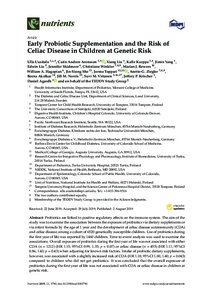Early probiotic supplementation and the risk of celiac disease in children at genetic risk
Ulla Uusitalo; Carin Andren Aronsson; Xiang Liu; Kalle Kurppa; Jimin Yang; Edwin Liu; Jennifer Skidmore; Christiane Winkler; Marian J. Rewers; William A. Hagopian; Jin-Xiong She; Jorma Toppari; Anette-G. Ziegler; Beena Akolkar; Jill M. Norris; Suvi M. Virtanen; Jeffrey P. Krischer; Daniel Agardh; TEDDY Study Group
Early probiotic supplementation and the risk of celiac disease in children at genetic risk
Ulla Uusitalo
Carin Andren Aronsson
Xiang Liu
Kalle Kurppa
Jimin Yang
Edwin Liu
Jennifer Skidmore
Christiane Winkler
Marian J. Rewers
William A. Hagopian
Jin-Xiong She
Jorma Toppari
Anette-G. Ziegler
Beena Akolkar
Jill M. Norris
Suvi M. Virtanen
Jeffrey P. Krischer
Daniel Agardh
TEDDY Study Group
MDPI AG
Julkaisun pysyvä osoite on:
https://urn.fi/URN:NBN:fi-fe2021042822897
Probiotics are linked to positive regulatory effects on the immune
system. The aim of the study was to examine the association between the
exposure of probiotics via dietary supplements or via infant formula by
the age of 1 year and the development of celiac disease autoimmunity
(CDA) and celiac disease among a cohort of 6520 genetically susceptible
children. Use of probiotics during the first year of life was reported
by 1460 children. Time-to-event analysis was used to examine the
associations. Overall exposure of probiotics during the first year of
life was not associated with either CDA (n = 1212) (HR 1.15; 95%CI 0.99, 1.35; p = 0.07) or celiac disease (n = 455) (HR 1.11; 95%CI 0.86, 1.43; p
= 0.43) when adjusting for known risk factors. Intake of probiotic
dietary supplements, however, was associated with a slightly increased
risk of CDA (HR 1.18; 95%CI 1.00, 1.40; p
= 0.043) compared to children who did not get probiotics. It was
concluded that the overall exposure of probiotics during the first year
of life was not associated with CDA or celiac disease in children at
genetic risk.
https://urn.fi/URN:NBN:fi-fe2021042822897
Tiivistelmä
Probiotics are linked to positive regulatory effects on the immune
system. The aim of the study was to examine the association between the
exposure of probiotics via dietary supplements or via infant formula by
the age of 1 year and the development of celiac disease autoimmunity
(CDA) and celiac disease among a cohort of 6520 genetically susceptible
children. Use of probiotics during the first year of life was reported
by 1460 children. Time-to-event analysis was used to examine the
associations. Overall exposure of probiotics during the first year of
life was not associated with either CDA (n = 1212) (HR 1.15; 95%CI 0.99, 1.35; p = 0.07) or celiac disease (n = 455) (HR 1.11; 95%CI 0.86, 1.43; p
= 0.43) when adjusting for known risk factors. Intake of probiotic
dietary supplements, however, was associated with a slightly increased
risk of CDA (HR 1.18; 95%CI 1.00, 1.40; p
= 0.043) compared to children who did not get probiotics. It was
concluded that the overall exposure of probiotics during the first year
of life was not associated with CDA or celiac disease in children at
genetic risk.
Kokoelmat
- Rinnakkaistallenteet [29337]
